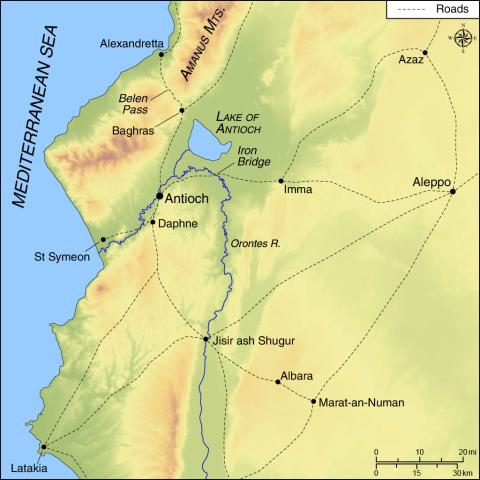Kerbogah Tries to Retake Antioch
[9.21.5] Reversus est itaque Curbaram ad suum exercitum; et prōtinus Turcī, dēlūdentēs Francōrum collēgium, dētulērunt ante cōnspectum Curbaram quendam vīlissimum ēnsem rūbīgine tēctum, et dēterrimum arcum ligneum, et lanceam nimis inūtilem, quae abstulerant nūper pauperibus peregrīnīs; dīxēruntque: “Ecce arma, quae attulērunt Francī obviam nōbīs ad pugnam.” Tunc Curbaram coepit surrīdēre, palam dīcēns omnibus: “Haec sunt arma bellica et nitida, quae attulērunt Chrīstiānī super nōs in Asiam, quibus putant nōs et cōnfīdunt expellere ultrā cōnfīnia Chorosāniae, et dēlēre omnia nostra, ultrā Amāzonia flūmina; quī prōpulērunt omnēs parentēs nostrōs ā Romāniā et Antiochiā urbe rēgiā, quae est honōrābile caput tōtīus Syriae?”
notes
(June 1098) When Kerbogah is shown some decrepit Frankish weapons he laughs at the notion that such people could defeat the Turks.
Francōrum collēgium: "the company of the Franks," i.e., their army.
ante cōnspectum Curbaram: here Cubaram (indeclinable) is genitive.
Haec sunt arma bellica et nitida, etc.: the beginning of a long rhetorical question.
super nōs: CL would be contrā nōs.
ultrā cōnfīnia Chorosāniae: “beyond the borders of Khorasan.” Our author gives various spellings for his Latin versions of Khorasan, a region of Persia.
Amāzonia flūmina: The Amazons supposedly lived somewhere in the steppes of central Asia. Our author imagines Kerbogah as an heir of Greco-Roman mythological traditions.
quī prōpulērunt, etc.: "Are these the people who expelled?" The reference is to a successful Byzantine campaign of the 10th century.
vocabulary
prōtinus: at once
dēlūdō dēlūdere dēlūsī dēlūsum: to mock
collegium –iī: company, association
ensis ensis, m: sword
rūbīgō –inis, f.: rust
nitidus –a –um: shining, bright

